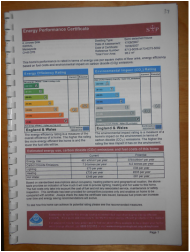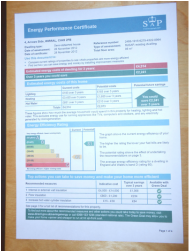
OLD STYLE EPC
The History of Energy Performance Certificates
Home Information Packs (HIPs) were introduced in December 2007 to provide valuable information at the start of the buying process. HIPs contained an array of information including a sale statement, local searches and evidence of title, all of which could save buyers both time and money. HIPs also included an energy performance certificate (EPC) with advice on how homeowners can reduce carbon
dioxide (CO2) emissions and fuel bills.
When the coalition government was formed in May 2010 one of their first actions was
to scrap HIPs irreversibly at 24 hours notice, despite having promised a 6 month
consultation period prior to being elected. With this it became the responsibility of the vendor to “commission” only an EPC prior to bringing their residential property to market, whilst the requirement for landlords remained the same in that they had to put an EPC in place only when a new tenant moved in.
Early Rules for Energy Performance Certificates
On September 9 2008, changes were made to regulations regarding the energy
performance of buildings and these alterations were rolled out on October 1,
2008 - from this date onwards, all properties that are built, sold or rented out
would require an EPC.
There were several measures introduced in an attempt to improve the energy performance of buildings after it was revealed that our buildings are responsible for almost 50 per cent of the UK`s energy consumption and carbon emissions. The way a building is constructed, insulated, heated and ventilated will affect its carbon emissions.
The measures included the introduction of EPCs with A-G efficiency ratings for properties - the most efficient homes, which in turn should have the lowest fuel bills, would fit into band A. However, unlike the refrigerators and freezers available today,
very few houses will boast even a B rating, never mind an A! These measures also
included recommendations on how a property`s energy efficiency can be improved,
thus lowering fuel bills and carbon emissions.
Other measures included: making it necessary for all public buildings to display energy certificates; making inspections of air conditioning systems essential; and giving advice and guidance to boiler users.
Why are Energy Performance Certificates important in the rental sector?
As stated above, landlords were required to supply tenants with EPCs from the first time they let a home ( after the October 1, 2008 introduction date ). The EPC is only valid for a
property that is self-contained and will remain valid for 10 years. Tenants interested in renting a property must have an EPC made available to them free of charge – only when you rent a room and share facilities is an EPC unnecessary.
An EPC report will make recommendations to improve energy efficiency in the home, the estimated cost of implementing those recommendations, the savings that could be made each year and how this wouldchange the energy and carbon emissions of a property.
Certification therefore raises the profile of energy efficiency for properties by making the
system visible, quantifiable and mandatory. It will enhance transparency and make it easier for tenants to compare properties like-for-like.
This inturn could have a huge impact on the rental sector. For example, landlords
considering investing in a property - and tenants considering letting one - will think about the sustainability issues and the cost of utilities to service those buildings. In the autumn of 2011 there were huge price hikes for both gas and electricity from all of the UK`s `big six` energy providers – Eon, Scottish Power, British Gas, Scottish & Southern Energy, Npower and EDF Energy. This has pushed the issue of energy efficiency to the forefront of people`s minds as they look to keep a lid on their living expenses.
The EPC system places much greater emphasis on energy performance allowing tenants
to make an informed decision before they commit to letting a property.
Landlords' and Tenants' rights
Remember landlords are now legally obliged to supply EPCs to prospective tenants on
request unless a tenant is renting just a room and sharing facilities. EPCs can only be produced following an assessment from an approved domestic energy assessor and the cost, when ordered from an estate agent for an average home, will be about £95 excluding VAT.
Vendors' rights
We believe that most vendors will want their estate agents to include energy
ratings in their sales particulars and will therefore need the EPC to hand
before marketing! Vendors would also benefit by having a copy of the whole EPC
to show prospective buyers who would surely like to see more than the bar graph
in the estate agent’s particulars.
Further Options for Landlords and Vendors
Should vendors or landords wish to carry out improvements to their properties in line
with the initial EPC’s recommendations an updated EPC reflecting these improvements will be made available from Wirral EPCs for a small nominal fee representing a fraction of the original cost.
This will increase the relevance of the EPC to the property now that the Government
have decreed that all EPCs, whether on marketed properties or rental properties are valid for 10 years and so an EPC can mistakenly represent a property for 10 years if the property has been improved and another EPC not been lodged to represent that improvement!
Home Information Packs (HIPs) were introduced in December 2007 to provide valuable information at the start of the buying process. HIPs contained an array of information including a sale statement, local searches and evidence of title, all of which could save buyers both time and money. HIPs also included an energy performance certificate (EPC) with advice on how homeowners can reduce carbon
dioxide (CO2) emissions and fuel bills.
When the coalition government was formed in May 2010 one of their first actions was
to scrap HIPs irreversibly at 24 hours notice, despite having promised a 6 month
consultation period prior to being elected. With this it became the responsibility of the vendor to “commission” only an EPC prior to bringing their residential property to market, whilst the requirement for landlords remained the same in that they had to put an EPC in place only when a new tenant moved in.
Early Rules for Energy Performance Certificates
On September 9 2008, changes were made to regulations regarding the energy
performance of buildings and these alterations were rolled out on October 1,
2008 - from this date onwards, all properties that are built, sold or rented out
would require an EPC.
There were several measures introduced in an attempt to improve the energy performance of buildings after it was revealed that our buildings are responsible for almost 50 per cent of the UK`s energy consumption and carbon emissions. The way a building is constructed, insulated, heated and ventilated will affect its carbon emissions.
The measures included the introduction of EPCs with A-G efficiency ratings for properties - the most efficient homes, which in turn should have the lowest fuel bills, would fit into band A. However, unlike the refrigerators and freezers available today,
very few houses will boast even a B rating, never mind an A! These measures also
included recommendations on how a property`s energy efficiency can be improved,
thus lowering fuel bills and carbon emissions.
Other measures included: making it necessary for all public buildings to display energy certificates; making inspections of air conditioning systems essential; and giving advice and guidance to boiler users.
Why are Energy Performance Certificates important in the rental sector?
As stated above, landlords were required to supply tenants with EPCs from the first time they let a home ( after the October 1, 2008 introduction date ). The EPC is only valid for a
property that is self-contained and will remain valid for 10 years. Tenants interested in renting a property must have an EPC made available to them free of charge – only when you rent a room and share facilities is an EPC unnecessary.
An EPC report will make recommendations to improve energy efficiency in the home, the estimated cost of implementing those recommendations, the savings that could be made each year and how this wouldchange the energy and carbon emissions of a property.
Certification therefore raises the profile of energy efficiency for properties by making the
system visible, quantifiable and mandatory. It will enhance transparency and make it easier for tenants to compare properties like-for-like.
This inturn could have a huge impact on the rental sector. For example, landlords
considering investing in a property - and tenants considering letting one - will think about the sustainability issues and the cost of utilities to service those buildings. In the autumn of 2011 there were huge price hikes for both gas and electricity from all of the UK`s `big six` energy providers – Eon, Scottish Power, British Gas, Scottish & Southern Energy, Npower and EDF Energy. This has pushed the issue of energy efficiency to the forefront of people`s minds as they look to keep a lid on their living expenses.
The EPC system places much greater emphasis on energy performance allowing tenants
to make an informed decision before they commit to letting a property.
Landlords' and Tenants' rights
Remember landlords are now legally obliged to supply EPCs to prospective tenants on
request unless a tenant is renting just a room and sharing facilities. EPCs can only be produced following an assessment from an approved domestic energy assessor and the cost, when ordered from an estate agent for an average home, will be about £95 excluding VAT.
Vendors' rights
We believe that most vendors will want their estate agents to include energy
ratings in their sales particulars and will therefore need the EPC to hand
before marketing! Vendors would also benefit by having a copy of the whole EPC
to show prospective buyers who would surely like to see more than the bar graph
in the estate agent’s particulars.
Further Options for Landlords and Vendors
Should vendors or landords wish to carry out improvements to their properties in line
with the initial EPC’s recommendations an updated EPC reflecting these improvements will be made available from Wirral EPCs for a small nominal fee representing a fraction of the original cost.
This will increase the relevance of the EPC to the property now that the Government
have decreed that all EPCs, whether on marketed properties or rental properties are valid for 10 years and so an EPC can mistakenly represent a property for 10 years if the property has been improved and another EPC not been lodged to represent that improvement!

NEW STYLE EPC
Post-April 2012 Energy Performance Certificates
In April 2012 a new style of EPC was introduced which is more user-friendly and which specifically ties in with Green Deal funding, available from January 28, 2013. The EPC designates improvement measures with green or orange ticks to indicate the likelihood of green deal funding.
In April 2012 a new style of EPC was introduced which is more user-friendly and which specifically ties in with Green Deal funding, available from January 28, 2013. The EPC designates improvement measures with green or orange ticks to indicate the likelihood of green deal funding.
"I contacted Mr Phil Smith to arrange an EPC for a property I was selling. He was most efficient. The job was arranged for the next day, He came on time, he did the survey at a very competitive price, and the certificate was in my hands a few days later. All in all, I found Phil and his company to be very good indeed and I would not hesitate to recommend them to anyone needing an EPC certificate"......................................................................................................................Pete M, Chester
